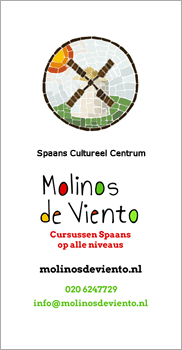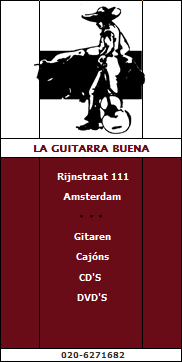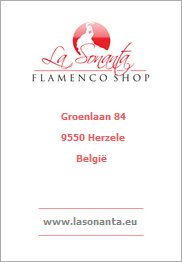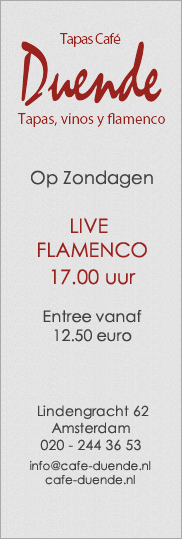Even so, 'Paseo de Gracia' has gotten by . . .
The album has taken a little longer, but there it is. I think it's nice and it has some melodies, some ways of expression and some interesting development of harmonies. There are interesting details on this record.
At first sight, you get the impression that it's less concentrated or perhaps more relaxed than 'Un momento en el sonido' . . .
At first sight. It has a lot of my way. But it's true that it approaches pop. There are some songs which are like I want to approach that world, perhaps in order to open myself up a little to other people. But it's because that search was inside of me. Many times an idea comes out and it might not be flamenco as such, but I'm going to express it as flamenco, because I don't think I know how to express it any other way… or shall we say, you can see through me. I didn't want to censor myself; I wanted to do it and it seems honest to me and also brave. This is a melody, for example… (and he plays it) It isn't flamenco, but it's really interesting.
The album is quite catchy . . .
Is it? The truth is that I always want the music to form a part of you, for it to be the same as if you've made it yourself. And by this I don't mean that I make music thinking of others; I make it searching inside of me. I seek the most interesting forms. Making an album is like looking at yourself in the mirror and wondering: what's up, Doc? You look at yourself and you see the little wrinkles, the pimples… but you have to remove all those superfluous things and look at the nicer things you have inside.
And what you've found are melodies, above all else. Is it true that you've set yourself the challenge of singing with the guitar?
Of course I have. If you realize it, songs with collaborations like that of Niña Pastori is like a challenge of me singing what she's singing as she goes along (and he hums it and plays it). To play them, I have to sing it even if it’s bare-stringed… And the guitar has what it has, you have to make the guitar be like an organ in your body, like your throat. And in that sense it's a flamenco challenge, because cante is the mother.
 Are you one of those guitarists who feel like frustrated cantaores?
Are you one of those guitarists who feel like frustrated cantaores?
No! I have enough frustration as a guitarist to want to be a cantaor on top of it. I do have that restlessness, and I'm more and more of a cante enthusiast. I like it, I like it. I consider it a way of expressing what you have inside which is totally direct.
The voices of Rafael de Utrera and Miguel Ortega are heard . . .
They're my fellow sufferers when I go out there. When I started recording they told me to count on them for whatever I wanted and I held them to their word. There's a bulería for each of them, and Nani Cortés and Lin Cortés also collaborate, who are two siblings who sing really well; each of them is phenomenal in their tessitura. I'm happy with those collaborations… and with the others, of course. I don't do without Tino di Geraldo while I can; I don't surrender.
The accompaniment smacks of a group. Was it your idea for it to sound like that?
Yes, but in reality when I began the album, I didn't know where it was going. I prefer to get in there and… The hardest part of an album might be getting started, until you get halfway through it you don't start to see that it's taking shape. You then come up a little bit. An album is still a little agonizing until you see it completely (and he does some strumming, and another melody …).
This interview-concert is knocking me out. I don't even know what I wanted to ask you any more... Ah yes, as special collaborations there's that of Niña Pastori. Was it in return for yours on her album?
Niña Pastori has sung fabulously. I didn't want to charge her for that; far from it. It's sharing, all those collaborations mean that to me; sharing music which comes out of me with them and also making it yours in the end. Even if it belongs to the one who's listening. Niña Pastori is marvelous there. Enrique Morente is superb. "Autorretrato" is a very serious song and it needed a voice with that experience and that weight. Then I think the song with Alejandro Sanz from a flamenco's perspective is a track which really approaches pop. I remember Enrique saying that Alejandro sang more flamenco than ever there. And Pedro el Granaíno also sings… I think that song has turned out really well.
And at the end, Estrella Morente . . .
Estrella's is a jewel; they're very flamenco tangos. That song is really curious. I was going to invite Estrella to Alejandro's song for her to share it with him, but it didn't suit her with regards to the tessitura. If she had to sing high it was too high and if she sang low, it didn't suit her either. I wanted her to be up to scratch as what she is. I named it after her, for she's the star shining in Granada and wherever she goes. Enrique told me that if I didn't have anything else around, to look for something. And he thought those tangos were great for her… which I had tucked away for the following album. The truth is that it's turned out really nice. I was going to tell you that I sing the melody for her (of course, he plays it), that I have to sing it, too. I accompanied her because today we do have the means to be able to do that; God only knows if some other day I'm going to be able to count on each of them with their busy agendas. She did those lyrics, she did the others, those of the caramel lips, two or three other sets, and afterwards I did the song in terms of that. And it's turned out… It's also interesting to work like that, really freely besides (…and he goes on playing).
How is it that you pick up the electric guitar?
As they say, I flirt around there. "You’ve flirted around with the electric guitar". Oh yes, I kiss it a little, ha ha ha. That's a musician’s little fling. We were at the studio and Lauren, my technician, had some guitars which belong to his brother. And I tried out a different sound at a given turn. And I see it as honest, too; I think it went in agreement with what I was feeling. May electric guitarists forgive me, but times are really tough; they can tell it to the company… Ha ha ha. And it isn't just the sound there, but rather what I play is a little bit other stuff which isn't my thing. I try to like put myself in the shoes of a jazz guitarist or something like that, with respect, of course. I said: I'm going to take the plunge and see what happens. It puts you in a different tessitura (he keeps on playing and at the finish I take advantage to ask the last question).
The tour is already starting. What are the live shows going to be like?
I'm going to stick in the songs little by little, I'm going to try them out. I'm going to play with my group. Alexis (Lefèvre) is going to come on some occasions; he's a great musician, he has a lot of heart, I like him. And Miguel Ortega and Rafael de Utrera will come; sometimes both of them and others, just one. And then, Patricio and José Manuel, who are musicians who have always come with me.
And will there be any surprises with the guests on the album?
I don't think so; it’s complicated. The truth is that these aren't times for surprises.
And with that acid phrase, the recorder is turned off. There at the back of the hall, seated on the fluffy dark green leather armchair, Vicente Amigo remains alone with his guitar, talking to one another…
Interview by Silvia Calado. Madrid, May 2009
Translation: Joseph Kopec












